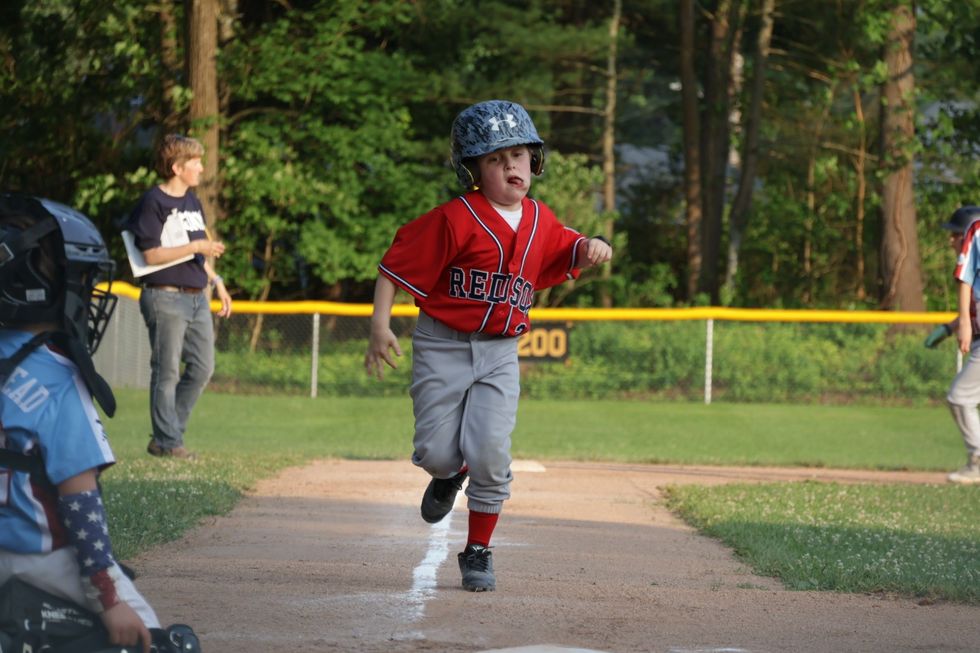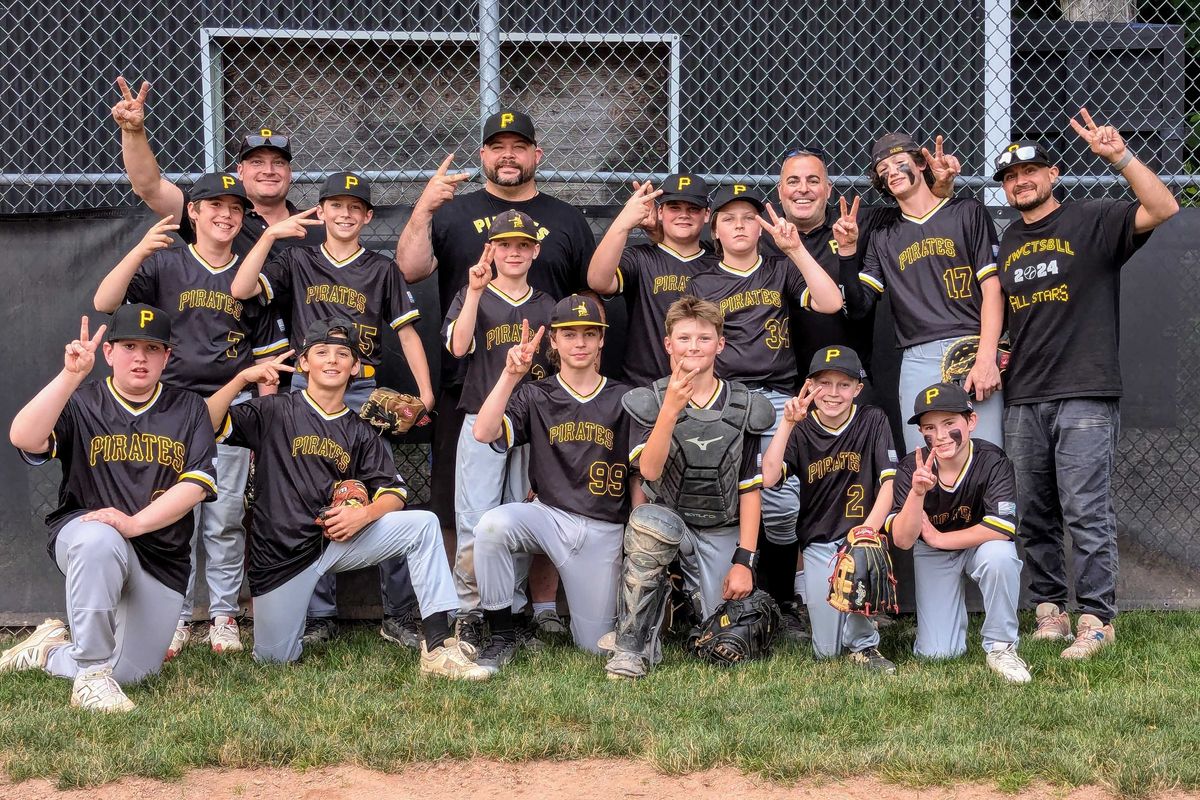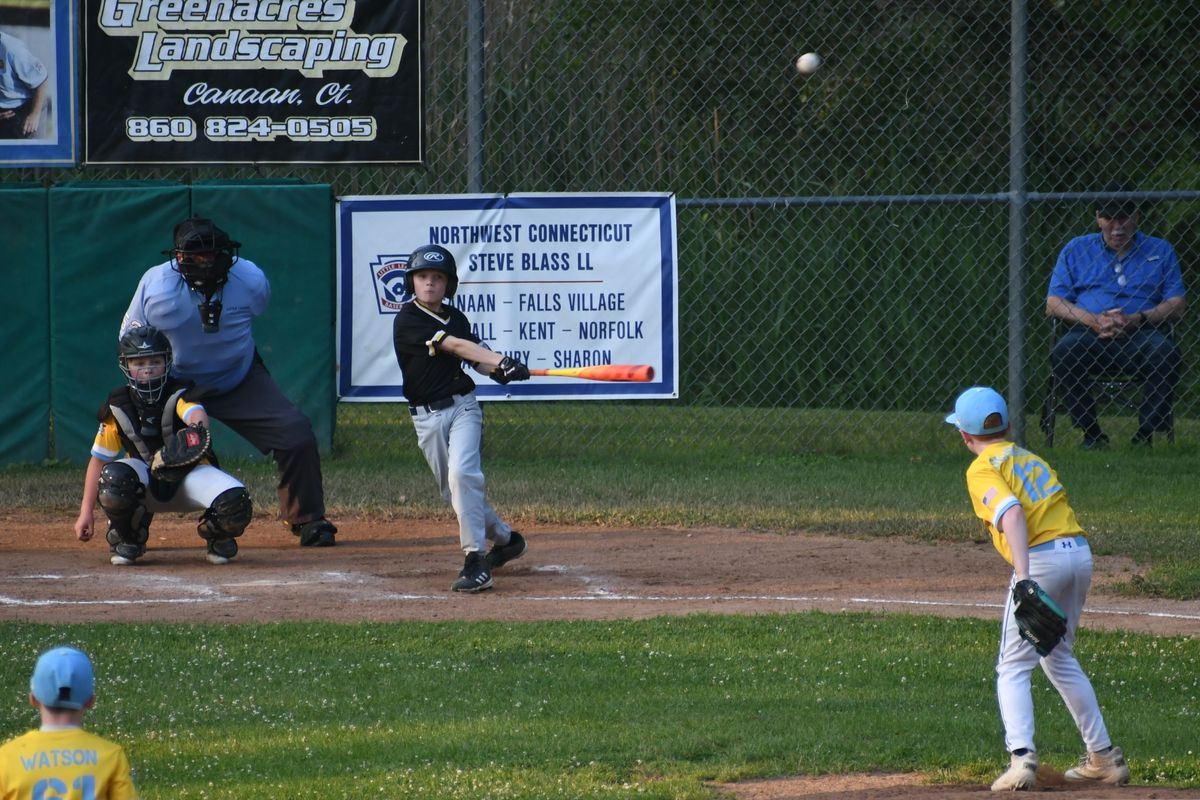Latest News
Pirates go back-to-back as league champs
Jun 14, 2025
The Canaan Pirates pose as champions after defending the Northwest Connecticut District 6 Majors Little League title.
Photo by Riley Klein
THOMASTON — The Canaan Pirates are champions once more.
In the Northwest Connecticut District 6 Majors Little League title game Friday, June 13, the Pirates defeated Thomaston JRC Transportation by a score of 6-2.
Brody Ohler pitched a two-hitter for Canaan. Milo Ellison relieved him, facing one batter who flew out to right field where Ben Young secured the final out.
Canaan never trailed in the game against top-ranked Thomaston, which lost one game all season prior to the championship. Both JRC losses came from the Pirates, with players aged 10 to 12 from Cornwall, Falls Village, Kent, Norfolk, North Canaan, Salisbury and Sharon.

In the title game at Reeves Field in Thomaston, the Pirates started strong with a lead in the top of the first inning. Ohler singled, then stole second base. Liam Downey brought him home with a single, then Sam Hahn doubled to put runners on second and third. Ellison brought them both home with a triple and the Pirates took a 3-0 lead.
The margin held until the sixth inning when the Pirates extended their lead to 6-0. With J.T. Farr and Bentley King on, Ohler sent a deep shot to center field and rounded the bases for an in-the-park home run.
In the bottom of the sixth, Ohler surrendered two runs before reaching his pitch limit. Ellison stepped in to end the game with some help from Young in right field.
The Pirates piled on Young in the outfield chanting “Benny! Benny!” The two sides shook hands in the spirit of sportsmanship before trophies were awarded.

After winning the District 6 title for the second straight year, Coach Tom Downey said "It feels awesome. Especially this group who worked really hard. Last year we were dominant, this year these guys worked their butts off."
"We definitely earned it," said third baseman Michael Prisco.
Ohler finished with nine strikeouts on the mound, three hits in three at bats, two RBI and a home run. Ellison hit 1-for-2 with two RBI, Liam Downey went 1-for-3 with an RBI, Sam Hahn and J.T. Farr hit 1-for-3 and Sam Hamlin hit 1-for-2.
For Thomaston, Owen H. hit 1-for-2 with two RBI and Lucas K. hit 1-for-2. The pitching trio of Gavin M., Jackson Ether and Brody Conlon combined for 12 strikeouts.

Keep ReadingShow less
Red Sox end season with comeback win
Jun 13, 2025
NORTH CANAAN — The Canaan Red Sox ended the season with a thrilling 14-13 win over the Tri-Town Phillies Thursday, June 12.
Canaan trailed for most of the game but kept it close. Ultimately, the Red Sox secured the victory with a final-inning comeback in front of the home crowd at Steve Blass Field.
The Red Sox rejoiced as victors. Reflecting on the season, Coach Nikki Blass stated, “My boys continue to come off the field smiling and doing better than the game before.”
The Red Sox are part of the Northwest Connecticut Steve Blass Little League AAA program, consisting of players aged 9 to 11 from Cornwall, Falls Village, Kent, Norfolk, North Canaan, Salisbury and Sharon. Tri-Town includes players from Goshen, Litchfield, Morris and Warren.

The result June 12 marked the first win of the season for the Red Sox. The night before, Coach Nikki Blass reassured her team with a letter, writing, “You should keep your heads high and know that you are all an asset to this team. Tomorrow we are clearing the slate and we will win.” She continued, “I hear in addition if you put a bat under your bed you get an amazing hit on game day.”
The bat trick paid off and many Red Sox logged hits in the game. “Everyone was on fire,” exclaimed Blass after the game.
Quinn McKniff pitched the majority of the match for Canaan with reliever Myles Shippa taking the mound for the final inning.

Offensively, Blaze Freund logged his first hit of the season. His twin brother Roan scored after sliding head-first into home “Pete Rose-style.” Myles Shippa recorded an RBI double in the game.
The Red Sox gathered beneath the scoreboard for a team photo after the win. With wide smiles and baseballs held high, the players ended another joyous Little League season.
Written by Riley Klein with reporting from Simon Markow.

Keep ReadingShow less
State Rep. Maria Horn (D-64) was treated for her injuries at Sharon Hospital.
Photo by John Coston
The day after concluding what has been described as a grueling legislative session, State Rep. Maria Horn (D-64) had a running accident, leaving her with a broken pelvis and collarbone among other more minor bruises and abrasions. Despite the injuries, she is in good spirits and recuperating at home, eager to get back on her feet.
Horn said after spending weeks in the assembly hall, she was eager to get some outdoor exercise in, but perhaps pushed a little too hard too soon. She said she was excited to get a run in on the morning of Friday, June 6, but was still exhausted from her time in Hartford and in the final stretch of recovering from a meniscus repair surgery in December.
Before the run, she told friends she was hoping for a “hard reset for [her] health,” she said with a rueful laugh.
Nearing the end of the loop, Horn said her leg was fatigued and gave out, causing her to fall on the pavement. She is grateful for the community members who helped during the ordeal, including an unknown motorist who waited with her until her husband arrived, and the staff at Sharon Hospital who she said were “wonderful.”
She was directed to keep weight off her hip for 4 to 6 weeks, and since her collarbone is also fractured, cannot use crutches so she’s partially wheelchair-bound for the time being. While she’s disappointed to be missing out on the start of hiking, biking and running season, she’s keeping her sights forward and focusing on recovery.
In the meantime, she said she’s grateful for the video and photo updates from her son, who is hiking the Connecticut portion of the Appalachian Trail: “I’m living vicariously through him.”
Keep ReadingShow less
Milo Ellison sends a fly ball to left field, bringing home Brody Ohler and Sam Hahn in a walk-off win for the Canaan Pirates June 11.
Photo by Riley Klein
NORTH CANAAN — The Canaan Pirates advanced to the league championship after a comeback victory over the Tri-Town Red Sox Wednesday, June 11.
Down 3-2 with two outs and two on in the bottom of the 6th inning, "Mighty" Milo Ellison stepped up to the plate and launched a fly ball deep to left field. The single brought home Brody Ohler and Sam Hahn for a walk-off Pirates win.
"Milo did it," shouted a teammate. "Let's hear it for Milo!"
Elite pitching from both sides kept the game close. Starter Sam Hahn pitched five and one-third innings for the Pirates and recorded 10 strikeouts. For the Red Sox, Joey B. struck out 11 batters over five innings.

Milo Ellison led the Pirates offensively, batting 2-for-3 with one run and three RBI. Sam Norbit logged an RBI and went 1-for-2 at the plate for Canaan.
"Nothing like a walk-off," said a spectator after the Pirates won 4-3.
Canaan, which includes players aged 10-12 from the six Region One towns and Norfolk, will face top-ranked JRC Transportation in the Northwest Connecticut District 6 Little League title game.

The Pirates are the reigning champs of District 6 and have a 10-2 record this season. Brody Ohler, who pitched the win in last year's championship, is expected to start on the mound once again for Canaan.
JRC Transportation led the league this season with a record of 11-1. Canaan delivered JRC its lone loss 1-0 on May 27, but JRC defeated Canaan 15-4 in the June 6 rematch.
The championship will be played at Reeves Field in Thomaston Friday, June 13, at 6 p.m.

Keep ReadingShow less
loading







